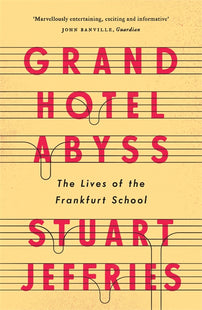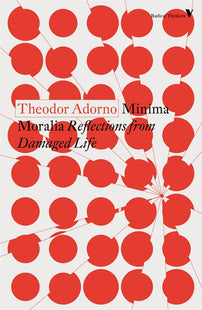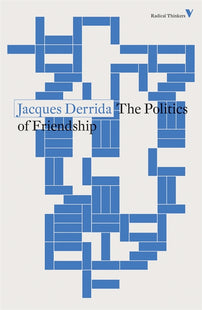The Opposite of Forgetfulness: Adorno on Gift-Giving
As we start our descent towards the seasonal hell of present buying, mutual recrimination, and buyer's remorse, it’s worthwhile to reflect on Adorno’s thoughts on gift-giving.

To mark the publication of Stuart Jeffries' Grand Hotel Abyss: The Lives of the Frankfurt School in paperback we're publishing excerpts and pieces related to Frankfurt School thinkers.
No exchanges allowed. – Human beings are forgetting how to give gifts. Violations of the exchange-principle have something mad and unbelievable about them; here and there even children size up the gift-giver mistrustfully, as if the gift were only a trick, to sell them a brush or soap. For that, one doles out charity [in English in original], administered well-being, which papers over the visible wounds of society in coordinated fashion. In its organized bustle, the human impulse no longer has any room, indeed even donations to the needy are necessarily connected with the humiliation of delivery, the correct measure, in short through the treatment of the recipient as an object. Even private gift-giving has degenerated into a social function, which one carries out with a reluctant will, with tight control over the pocketbook, a skeptical evaluation of the other and with the most minimal effort. Real gift-giving had its happiness in imagining the happiness of the receiver. It meant choosing, spending time, going out of one’s way, thinking of the other as a subject: the opposite of forgetfulness. Hardly anyone is still capable of this. In the best of cases, they give what they themselves would have wished for, only a few shades of nuance worse. The decline of gift-giving is mirrored in the embarrassing invention of gift articles, which are based on the fact that one no longer knows what one should give, because one no longer really wants to. These goods are as relationless as their purchasers. They were shelf warmers [Ladenhueter] from the first day. Likewise with the right to exchange the gift, which signifies to the receiver: here’s your stuff, do what you want with it, if you don’t like it, I don’t care, get something else if you want. In contrast to the embarrassment of the usual gifts, their pure fungibility still represents something which is more humane, because they at least permit the receiver to give themselves something, which is to be sure simultaneously in absolute contradiction to the gift.
In relation of the greater abundance of goods, which are available even to the poor, the decline of gift-giving may appear unimportant, and considerations on such as sentimental. However, even if it became superfluous in a condition of superfluity – and this is a lie, privately as well as socially, for there is no-one today whose imagination could not find exactly what would make them thoroughly happy – those who no longer gave would still be in need of gift-giving. In them wither away those irreplaceable capacities which cannot bloom in the isolated cell of pure interiority, but only in contact with the warmth of things. Coldness envelops everything which they do, the friendly word which remains unspoken, the consideration which remains unpracticed. Such iciness recoils back on those from which it spread. All relations which are not distorted, indeed perhaps what is reconciliatory in organic life itself, is a gift. Those who become incapable of this through the logic of stringency [Konsequenz: consequence, corollary], make themselves into things and freeze.
This is a superb passage from Minima Moralia, but one that would have made it difficult for friends to know what to get Adorno for his birthday. Probably not socks, though if any of them had made that error, it would have been wise to keep the receipt so he could take them back. At least that would have given him the pleasure of being able to lecture the gift giver on the “fungibility” of gift-giving, by which he meant the chilly suggestion implicit in each and every thoughtless gift, namely: “if you don’t want it, that’s all the same to me, get something else instead."
And certainly not iTunes vouchers, since they would demonstrate all too clearly that the gift giver has scarcely spent any time on thinking about what Adorno might like.
Socks and iTunes vouchers, viewed thus, aren’t presents but insults. Worse, they unleash a mutually disappointing vicious circle wherein the recipient is annoyed at what she’s been given and the giver livid at the ungrateful reaction. Don’t pretend you haven’t been in that circle.
That said, were Adorno still alive today, I don’t think it would have been so difficult to elude this woeful circle. I’d get him the DVD box set of the first season of Daktari, the wholesome late sixties drama series about an American vet working in Africa, starring Judy the Chimpanzee and Clarence the Cross-Eyed Lion, which Theodor and Gretl, improbably, used to enjoy watching in their declining years. And, probably, a DVD machine to play it on.
As we start our descent towards the seasonal hell of present buying, mutual recrimination, and buyer's remorse, it’s worthwhile to reflect on Adorno’s thoughts. Who among us gives in the manner Adorno seems to nostalgically yearn for? Who breaks from the shackles of administered society and the chilly cost-benefit calculations endemic to it when they buy presents? Who gives without expectation of reward or the paid-off debt that is gratitude? Hardly any of us is my guess.
But, to my mind, there is something fetishistic in Adorno’s romanticising of what gift-giving was like before we forgot how to do it properly, for all that his suggestion that the principle of exchange underpinning capitalism has corrupted how humans relate to each other seems to my mind obviously right. He seems to suggest that humans used to know how to give gifts gratuitously even virtuosically. I seriously doubt that gift-giving utopia ever existed.
True, he makes a good point about charitable gift-giving — how it “papers over the visible wounds of society in coordinated fashion." Certainly, charity has long been viewed sceptically by leftist thinkers, who take it as a means of keeping the poor in their place. Charitable giving for them is a gesture masquerading as kindness but involving, rather, aggressively humiliating the recipient. In 1845, Engels wrote in Condition of the Working Class in England: “Charity — when he who gives is more degraded than he who receives. Charity — when those who dispense alms also insist that those who receive them must first be cast out of society as pariahs." When I give some coins to the man sleeping rough under the bridge at Finsbury Park Tube station, I may yearn for his gratitude but, really, I’m entitled to only the opposite, since to give in such circumstances is a degrading act masquerading as kindness.
In Stigma and Social Welfare, Paul Spicker writes: "There is a conflict between reciprocity and altruism. Where reciprocity is the norm, there can be no such thing as a pure gift: some return is demanded or expected.” But has there ever been altruism without reciprocity or is that just a utopian dream?
Certainly reciprocity is the norm in our society. You give in the expectation of getting something back, even if it is as minimal as a glance of gratitude. Gift-giving thus becomes, as Jacques Derrida put it part of the “madness of economic reason." For Derrida every gift is bound in a system of exchange that makes giving it an impossibility. Even if a gift was given freely and with the imagination that Adorno supposed hardly anyone now is capable of, it could only become recognised as gift by means of its annulling opposite, reward: even if that reward is mere recognition by the recipient, the gift as such is undone, made impossible. Just as it is hard to imagine, for us as we live in capitalist societies, what it would be like if goods were made for use rather than for sale, so it is impossible — or so Derrida contends — to imagine what it would be for a gift to be given without the recipient becoming thereby indebted. “If the other gives me back or owes me or has to give me back what I give him or her, there will not have been a gift, whether this restitution is immediate or whether it is programmed by a complex circulation of a long-term deferral or difference,” argued Derrida in Given Time. In that book, gift-giving turns into a philosophical paradox, a social institution that undoes itself. On the plus side, this surely entails that there was no point getting a birthday present for Derrida, not even socks.
Derrida coined the phrase “madness of economic reason” in his commentary on another, non-capitalist form of gift-giving. The French sociologist Marcel Mauss had investigated “potlach” ceremonies of British Columbian indigenous communities. What Mauss noted, as David Harvey writes in his new book Marx, Capital, and the Madness of Economic Reason, was that these ceremonies entailed competition between households to give away or destroy possessions.
But there was something very different in these potlatch ceremonies from the gift-giving with which we are familiar. “It is not even a question of giving and returning,” wrote Mauss in The Gift, “but of destroying so as not even to appear to desire repayment.” The potlatch gift-giving ceremonies did not demand that recipients repay their debt to the gift giver, to be sure, but rather were premised on the gift givers’ expectation of as Harvey points out, of increasing prestige, honour, and status as a result. Viewed thus, potlatch ceremonies were lacking in the gratuitousness Adorno yearned for from true gift-giving.
What we seem to lack, as humans, is gift-giving without expectation of reward, be it power or the settling of a debt.
Adorno hoped for more. Spontaneous and joyful gift-giving is possible, he thought. “Every undistorted relationship, perhaps indeed the conciliation that is part of organic life itself, is a gift.” A lovely thought, though one painfully suggesting that we have a notion of how to give gratuitously that remains unrealised, perhaps even unrealisable, certainly in capitalist society.
[book-strip index="1" style="display"]


